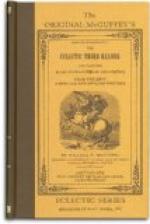“All day the low-hung clouds have
dropped
Their garnered fullness down.
All day a soft gray mist hath wrapped
Hill, valley, grove and town.”
Bryant’s “Death of the Flowers;” Campbell’s “Lochiel’s Warning;” and the trial scene from Shakespeare’s Merchant of Venice. All these became favorite reading exercises in later years.
As late as 1840 the Bible was read daily in all the schools of the West. Although sectarian or denominational teaching was not permitted, religious instruction was desired by the great majority of school patrons.
Even up to the opening of the Civil War, whatever the faith or the practice of the adult inhabitants of the country, the Bible story and the Bible diction were familiar to all. The speeches of the popular orators of that day were filled with distinct allusions to the Bible and these were quickly and clearly apprehended by the people. It may be questioned whether popular speeches of the present day would have equal force if based on the assumption that everybody knows the Biblical stories. Indeed it is a common remark made by professors of English in the higher institutions of learning that pupils know little of the Bible as a distinctly formative and conservative element in English literature. In the texts authorized for the study of English classics, Biblical allusions are very common. These have little meaning to pupils who have not read the Bible, unless the passage is pointed out and hunted up.
[Dr. Swing’s Opinion]
From the pages of these readers the pupils learned to master the printed word and obtain the thought of the authors. Without conscious effort they received moral instruction and incentives toward right living. Without intent they treasured in their memories such extracts from the authors of the best English Literature as gave them a desire to read more.
[Books as Teachers]
In one of his sermons Dr. David Swing of Chicago said: “Much as you may have studied the languages or the sciences, that which most affected you was the moral lessons in the series of McGuffey. And yet the reading class was filed out only once a day to read for a few moments, and then we were all sent to our seats to spend two hours in learning how to bound New Hampshire or Connecticut, or how long it would take a greyhound to overtake a fox or a hare if the spring of each was so and so, and the poor fugitive had such and such a start. That was perhaps well, but we have forgotten how to bound Connecticut, and how to solve the equation of the field and thicket; but up out of the far-off years come all the blessed lessons in virtue and righteousness which those reading books taught; and when we now remember, how even these moral memories have faded I cannot but wish the teachers had made us bound the States less, and solve fewer puzzles in ‘position’ and the ‘cube root’ and made us commit to memory the whole series of the McGuffey Eclectic Headers. The




